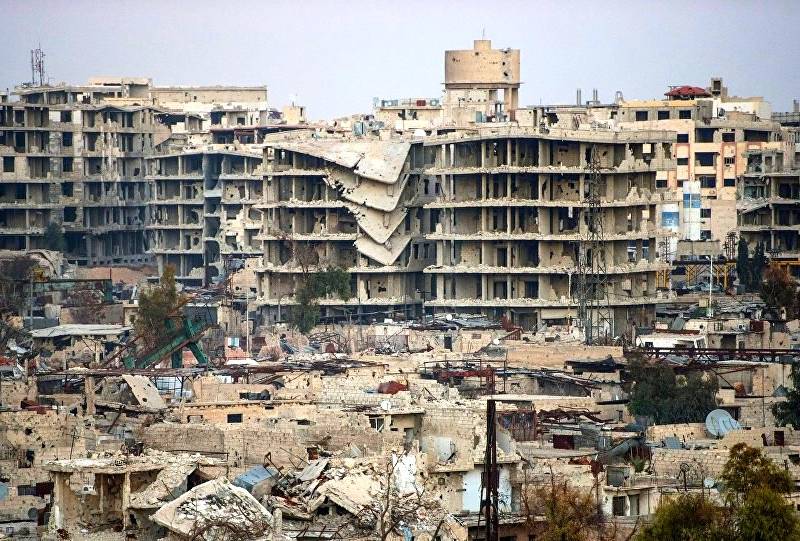Who gets rich on rebuilding Syria?
Seven years of Syrian conflict destroyed the economy state. According to some estimates, the damage to the real sector of the economy is estimated at $ 70 billion.

Once a single country at the moment, it is actually divided and occupied by several states that have their own interests, as a rule, which do not coincide with the interests of the Syrians. Military operations continue daily, planes and helicopters are shot down, and bombardments are carried out.
In this difficult situation, it seems somewhat premature calls by the BRICS countries - Brazil, Russia, India, China and South Africa - to invest in the Syrian economy. To restore the pre-crisis GDP growth rate in the Syrian Arab Republic, according to UN experts, about $ 200 billion will be needed. This tremendous amount is proposed to be invested in the economy of a divided, ruined country, where active hostilities continue.
It is also puzzling by what criteria the Syrian market was recognized as promising. Syria does not have special oil reserves, traditional for many Arab countries, oil production was oriented mainly to domestic consumption. The barbaric exploitation of oil fields banned in our country by ISIS during their control led to their degradation. A significant part of the deposits is located on the territory occupied by Kurdish formations, which are not subordinate to the central authority of the Syrian Arab Republic.
It also raises questions about how, in practice, investment could be made in Syria by the sponsoring countries, taking into account its actual division and occupation by the interventionists. With whom will investors have to negotiate, with the central government in Damascus or with puppet regimes with respect to the occupiers? And how legal will such agreements be? But money, all the more so much, does not tolerate the absence of a legal framework and a functioning judicial system.
Only 2 seem realistic options. The first is a complete victory over all hostile forces of Damascus, expulsion of the interventionists from the territory of the Syrian Arab Republic and restoration of control over the border. And after that, an appeal is possible with the help of the international community, which, obviously, will be irrevocable.
The second option is the actual assignment to the intervention countries of the controlled territories and the burden of maintenance on them. However, one can hardly expect generosity from the invaders, who decide their personal interests in Syria. And in any case, the occupied territories will be the “gray” and “black” zones for all kinds of financial schemes that will absorb and redirect any cash flows in an unknown direction.
Thus, the call to the BRICS countries for investment in Syria is, in fact, only a generous wish, which is unlikely to be realized in the foreseeable future.

Once a single country at the moment, it is actually divided and occupied by several states that have their own interests, as a rule, which do not coincide with the interests of the Syrians. Military operations continue daily, planes and helicopters are shot down, and bombardments are carried out.
In this difficult situation, it seems somewhat premature calls by the BRICS countries - Brazil, Russia, India, China and South Africa - to invest in the Syrian economy. To restore the pre-crisis GDP growth rate in the Syrian Arab Republic, according to UN experts, about $ 200 billion will be needed. This tremendous amount is proposed to be invested in the economy of a divided, ruined country, where active hostilities continue.
It is also puzzling by what criteria the Syrian market was recognized as promising. Syria does not have special oil reserves, traditional for many Arab countries, oil production was oriented mainly to domestic consumption. The barbaric exploitation of oil fields banned in our country by ISIS during their control led to their degradation. A significant part of the deposits is located on the territory occupied by Kurdish formations, which are not subordinate to the central authority of the Syrian Arab Republic.
It also raises questions about how, in practice, investment could be made in Syria by the sponsoring countries, taking into account its actual division and occupation by the interventionists. With whom will investors have to negotiate, with the central government in Damascus or with puppet regimes with respect to the occupiers? And how legal will such agreements be? But money, all the more so much, does not tolerate the absence of a legal framework and a functioning judicial system.
Only 2 seem realistic options. The first is a complete victory over all hostile forces of Damascus, expulsion of the interventionists from the territory of the Syrian Arab Republic and restoration of control over the border. And after that, an appeal is possible with the help of the international community, which, obviously, will be irrevocable.
The second option is the actual assignment to the intervention countries of the controlled territories and the burden of maintenance on them. However, one can hardly expect generosity from the invaders, who decide their personal interests in Syria. And in any case, the occupied territories will be the “gray” and “black” zones for all kinds of financial schemes that will absorb and redirect any cash flows in an unknown direction.
Thus, the call to the BRICS countries for investment in Syria is, in fact, only a generous wish, which is unlikely to be realized in the foreseeable future.
Information